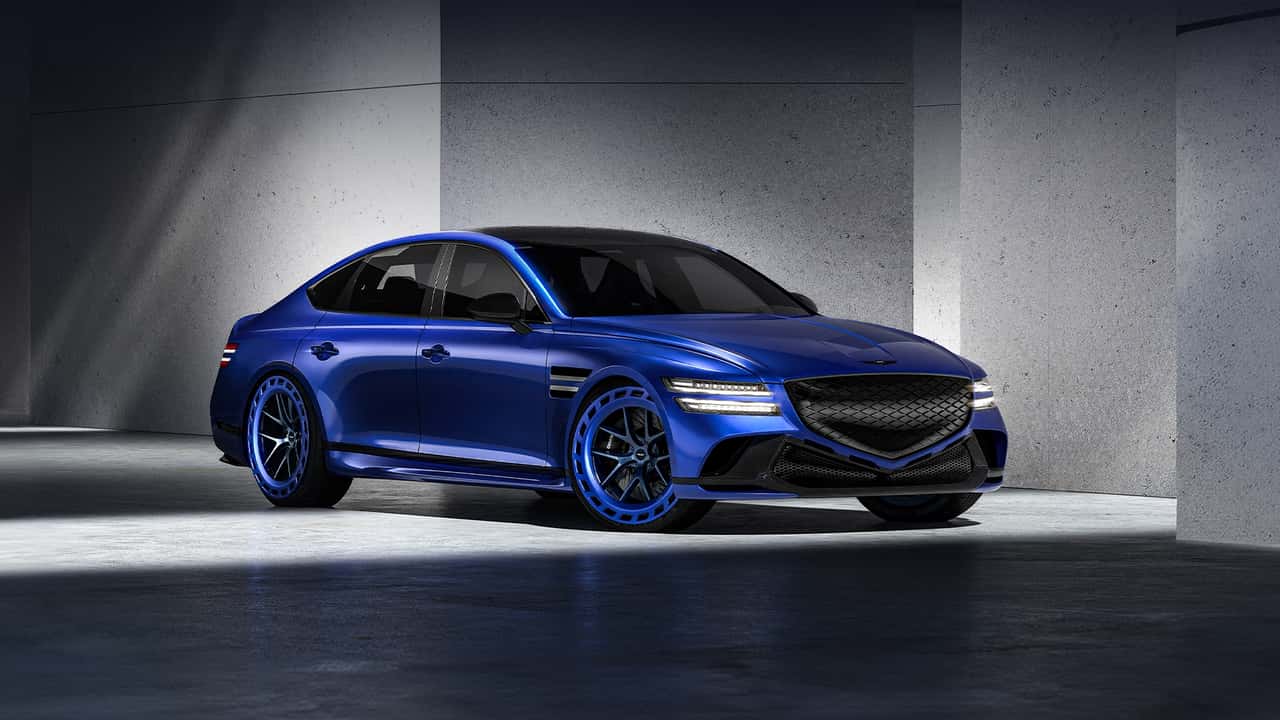Genesis, Hyundai Motor Group’s luxury automaker, had a plan of only selling new electric vehicles starting next year, but that plan seems to have changed.
Instead of going all-in on EVs, the Korean company will invest in bringing as many hybrids as possible as soon as next year to market, according to Genesis boss Mike Song, who spoke with TopGear on the sidelines of this year’s Goodwood Festival of Speed.
Get Fully Charged
The hybrid stopgap
This year is proving to be a roller-coaster ride for automakers who are trying to make it in the EV game. Some saw huge gains in sales, while others, including Tesla, saw their numbers drop as consumers seemed to employ a “wait it out” tactic. Companies like General Motors, Volkswagen and Kia are turning to hybrids to ease the transition to an all-electric lineup and to comply with upcoming emissions regulations. Genesis is getting in on the action now, too.
Currently, Genesis doesn’t sell any hybrid or plug-in hybrid, but with the new strategy in place, we’re bound to see them throughout the brand’s lineup. “We will apply it to as many models as possible,” Song said.
While this might come as a surprise, it shouldn’t. Kia, Hyundai’s sister company inside Hyundai Motor Group, already said that it’s working on adding more hybrids and plug-in hybrids across its portfolio of brands, so addressing the hybrid issue at Genesis was probably just a matter of time.
That said, the luxury automaker is still committed to having an all-electric lineup … at some point. “Electrification is still our vision. We will have 100% electrified vehicles, but the market and the customers now want hybrid more than EV, so we really want to bring Genesis hybrid into the market as soon as possible,” the brand’s boss told TopGear.
To solidify this, the same Mike Song said that Genesis is working on a new EV platform that, according to Edmunds, might be exclusive to the luxury brand and not shared with Hyundai and Kia, like the E-GMP platform that underpins models like the Hyundai Ioniq 5, Kia EV6 and Genesis GV60.

Genesis’ current EV portfolio (from left): Genesis GV60, Genesis Electrified GV70 and Genesis Electrified G80
As for what will power the new Genesis hybrids, we don’t know. They’ll likely use a similar setup as the upcoming Kia hybrids, but we’ll have to wait and see what that will be. An earlier report suggests that the GV70 SUV would get a range-extender hybrid for the 2026 model year in the United States, meaning it could be marketed as soon as next year.
If the latest X Gran Berlinetta and X Gran Racer Vision GT concepts have anything to do with reality, Genesis might cram a V6 and an electric motor under the hood of its upcoming hybrids. In the Berlinetta, the powertrain makes no less than 1,071 horsepower, while the Racer Vision GT ups that figure to a ridiculous 1,540 hp.
Genesis, the luxury vehicle division of Hyundai Motor Company, has recently announced that they will be adjusting their plans to focus solely on selling electric vehicles (EVs). This decision comes after the company realized that there is still strong demand for hybrid vehicles among consumers.
The shift in strategy was made in response to feedback from customers, who have expressed a preference for hybrid vehicles over fully electric ones. Genesis conducted market research and found that while EVs are gaining popularity, many consumers still have reservations about range anxiety and the lack of charging infrastructure. Hybrid vehicles, which combine traditional combustion engines with electric motors, offer a compromise between fuel efficiency and range.
According to a spokesperson for Genesis, the company remains committed to sustainability and reducing carbon emissions. However, they recognize that customers are not yet ready to fully transition to electric vehicles. By offering a range of hybrid options alongside their EV lineup, Genesis hopes to cater to a wider range of consumers and provide more flexibility in their product offerings.
This decision by Genesis reflects a broader trend in the automotive industry, where automakers are responding to evolving consumer preferences and concerns about sustainability. While electric vehicles are seen as the future of transportation, there is still significant demand for hybrid vehicles as a transitional technology.
In conclusion, Genesis’ decision to tone down their plan to only sell EVs in favor of offering hybrid vehicles is a strategic move that demonstrates their commitment to meeting customer needs and preferences. By listening to feedback and adapting their strategy accordingly, Genesis is positioning themselves as a leader in the luxury vehicle market and a company that is focused on sustainable transportation solutions.

